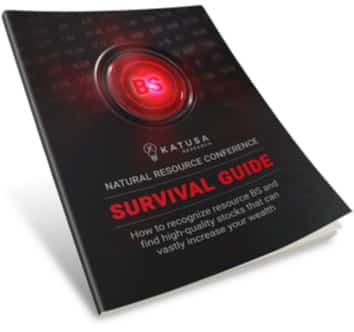Dear Vancouver Resource Investment Conference attendee,
As of October 2019, there were over 1,200 publicly-listed junior resource companies on Canadian stock exchanges.
While Canada is a major global player in junior resource finance, the industry doesn’t stop there. Between the U.S. markets, the Australian markets, and the London market, there’s at least 1,500 additional publicly-listed junior resource stocks in the world.
In total, that’s over 2,700 public stocks for the resource investor to choose from.
Exploring for and extracting raw materials like oil, natural gas, copper, gold, and uranium is a high-risk, high reward business… and so the unfortunate truth is that most of those 2,700+ stocks aren’t worth the paper they are printed on.
An investment in the average natural resource firm often becomes a roach motel for capital. The money will go in, but it won’t come out.
If you’re reading this letter, it’s likely that you’ve seen or are about to see many of these roach motel companies at a large natural resource investment conference.
More so than other industries like retail or manufacturing, the resource industry connects with its investors through conferences. These conferences act as major money-raising events for many resource companies.
At a large conference in my hometown and global mining finance center Vancouver, it’s common to see over 300 resource companies with a presence. They are all looking to attract investor capital. They all have a story to tell and stock to sell… from Aluminum to Zinc.
And you know what? Some of these opportunities are incredible. When a small resource firm executes an aggressive business plan or finds a large deposit, shares can soar thousands of percent. These big scores attract people to resource conferences every year.
But as I mentioned, an investment in the average resource firm doesn’t produce a big score. It just sends your capital to “money heaven.”
Making it to a natural resource conference can ring up a lot of travel costs. It takes up valuable time. That’s why I’ve written an exclusive “survival guide” to help you maximize the return on the money and time you invest into attending a natural resource conference.
We call it “The Katusa Research Natural Resource Conference Survival Guide: How to recognize resource BS and find high-quality stocks that can vastly increase your wealth.”
- The single most important factor to consider before buying a junior resource stock (this idea alone can transform a losing investor into a winner).
- Why most resource investors flock to the absolute worst countries to invest in (and how you can easily avoid their dumb mistake).
- How to quickly and easily determine if a company is about to dilute shareholders and water down your stake (this happens far too often, but it’s easy to avoid).
- And many, many other critical ideas to your success as a resource investor.
This is all hard-won knowledge written down by a guy who makes his living investing in the resource market… not some desk jockey analyst who has no money of his own on the line.
Long-time Katusa subscribers know I’m a big believer in the Pareto Principle. It states that 80% of your results come from 20% of your efforts. For that reason, it’s also called the “80/20” rule. For example, your business may generate 80% of its sales from 20% of your clients.
The Pareto Principle is alive and well in the resource sector. About 20% of resource operators create 80% of the value in the sector.
I’ve even taken Pareto’s principle a step further. Years ago, I coined the 4/64 Rule—I took the 80/20 Rule and subjected it to Pareto’s principle again. The result states that 4% of entrepreneurs create 64% of the wealth (80% of 80% is 64%, 20% of 20% is 4%, hence the 4/64 Rule).
If making a lot of money is your goal in the resource sector, I encourage you to do what I do; focus on the 4% of superstar entrepreneurs who own large stakes in their own companies. Invest with the best.
This “survival guide” contains a list of key questions I believe any intelligent investor should ask a mining company before considering an investment in it. It addresses critical aspects of a company, like project quality, management quality, and balance sheet.
If you put this idea and others in this guide to work, you’ll become a master at spotting BS and avoiding losing companies.
You’ll become a master at putting the Pareto Principle to work for your own benefit… and you’ll stand a very good chance of making many, many times any investment you make in a resource conference.
This guide is absolutely free to anyone who wants to grow as an investor and make their money work for them.
Click here to claim your copy.
See you at the conference.
Regards,
Marin Katusa



